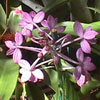|
|
|
|
|
| |
Flasks of
Calanthe kintaroi 'MC1544' -spontaneous |
|
| |
|
|
| |
| Number: |
TN2967 |
| Name: |
Calanthe kintaroi 'MC1544' -spontaneous
|
| |
Very LOW yield
|
| Type: |
spontaneous (What's that?) |
|
Seed Donor: |
Luis A. Valera, Luis' Orchids
(Email: luisxx@animail.net)
|
|
Click to Enlarge

Pod Parent Flower |
Click to Enlarge

Pod Parent Inflorescence |
|
|
|
| |
Culture Notes from Donor: Parent plant: Temperature range W (70-90°F)
Comments: Parent plant: It is not a fast growing plant. I have had this plant for three and a half years, and it has now began to divide into more plants. The flower spike took three weeks to open completly, but it was in bloom for almost three months. Medium-sized plant.
For additional origin/habitat information supplied courtesy of
Charles and Margaret Baker, see further below, near the bottom of this page.
|
Temperatures we attempt to use in the lab & greenhouse:
| For Species: |
|
Spring, Summer, Autumn: days average 81°F, nights 67°F; best fit is Intermediate 83-60°F
(Source:
Baker's Web OSC) |
| For Species: |
|
Winter: days average 79°F, nights 49°F; best fit is Cool 70-52°F
(Source:
Baker's Web OSC) |
|
About the name...
| Etymology of |
Calanthe |
|
From Greek "kalos" beautiful; "anthe" flower.
(Source:
Pridgeon 1992) |
| Pronunciation of |
Calanthe |
|
ka-LAN-thee
(Source:
Pridgeon 1992) |
|
If you would like to direct someone to this web page, please copy and paste this URL into your email:
http://troymeyers.com/d?012967
| Flask Information |
| Availability: |
We have sold all of the flasks for this item. |
| You should: |
Consider getting individual plants or compots instead of a flask.
You can place a "Notify Flask Recipients" Request, and either we or a flask recipient may contact you when plants are available.
You may also place a "Notify Retries" Request, and if an identical pollination (the same parents) is done again, we'll let you know.
You may reserve a flask, but it's very unlikely you'll get one ...this could only happen if we found a flask that we didn't know we had. |
| Yield Estimate: |
95 plants (based on flask surveys done 02/06/2003 )
|
| Plantlet Sizes: |
From many flasks 12 - 30 mm plants (based on flask surveys done 02/06/2003 )
From one most recently surveyed flask 20 - 30 mm (02/06/2003)
|
|
You might also want to:
|
View the seed assay for this item.
View items of the same species.
View items of the same genus.
|
| Ordering Information |
| You are not currently logged in. |
|
You must be a registered user and be logged in to reserve a flask or place a notification request. Please log in:
|
|
|
|
|
|
| |
The origin/habitat information below is supplied courtesy of Charles and Margaret Baker
The following information is based on the name of the plant provided by the donor, and assumes that the name is correct. If the plant has been misidentified, then the following information may not be correct.
This text is copyrighted by the Bakers and may not be reproduced without permission.
ORIGIN/HABITAT: Widespread from Africa, Madagascar, Sri Lanka (Ceylon),
India, China, Taiwan, southern Japan, the Ryukyu Islands, through most of
Southeast Asia, and into Borneo, Sumatra, and Java. In Sri Lanka, plants
are rather common under the shade of trees in tropical, wet, evergreen
forests at elevations up to 6000 ft. (1830 m). In India, this orchid has
been reported in Deccan, Mysore, N. Kanara, Western Ghats, Nepal, and
Sikkim. Plants in Bhuan, Darjeeling, and Sikkim have been reported as
growing in hot valleys and beside streams at 1100-6550 ft. (330 -2000 m).
In Thailand, collections have been reported in the northern mountains at
1300-4900 ft. (400-1500 m) and in peninsular Thailand at 1300 ft. (400 m).
In China, plants are found in moist, shady places in mountain forests or
along ravines at 2600-6550 ft. (800-2000 m) in the provinces of Hunan,
Guangdong, Guangxi, southern Yunnan, and southeast Xizang. Plants have
been reported from throughout Taiwan where they grow at 3300-6550 ft.
(1000-2000 m). In Borneo, plants are found in deep shade in Kalimantan,
Sabah, and Sarawak at 1300-5900 ft. (400-1800 m). In Sumatra plants have
been collected from various locations in the western part of the island at
1300-5250 ft. (400-1600 m). Plants have been found all over Java, but are
most common in eastern Java where they grow on the more humid,
south-facing slopes of the larger mountains at 1300-5250 ft. (400-1600 m).
More about this information and the Bakers...
|
|
|
| |
|
|
|